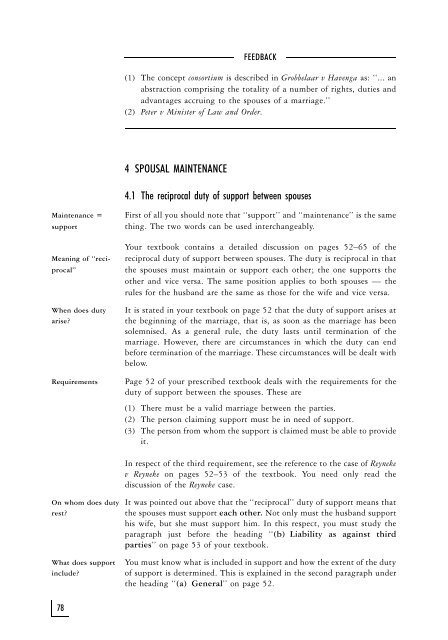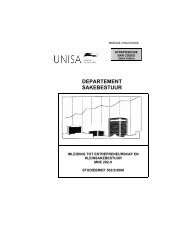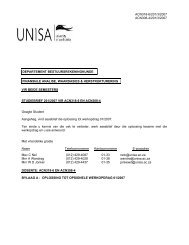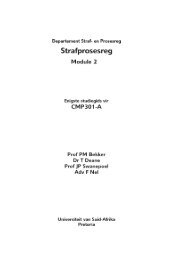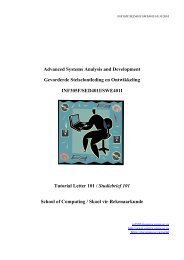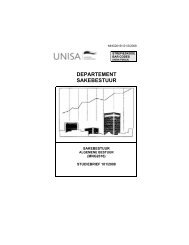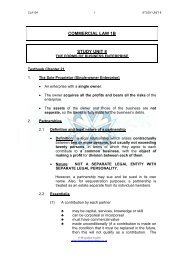key to the study guide - Name
key to the study guide - Name
key to the study guide - Name
You also want an ePaper? Increase the reach of your titles
YUMPU automatically turns print PDFs into web optimized ePapers that Google loves.
Maintenance =<br />
support<br />
Meaning of ``reciprocal''<br />
When does duty<br />
arise?<br />
FEEDBACK<br />
(1) The concept consortium is described in Grobbelaar v Havenga as: ``... an<br />
abstraction comprising <strong>the</strong> <strong>to</strong>tality of a number of rights, duties and<br />
advantages accruing <strong>to</strong> <strong>the</strong> spouses of a marriage.''<br />
(2) Peter v Minister of Law and Order.<br />
4 SPOUSAL MAINTENANCE<br />
4.1 The reciprocal duty of support between spouses<br />
First of all you should note that ``support'' and ``maintenance'' is <strong>the</strong> same<br />
thing. The two words can be used interchangeably.<br />
Your textbook contains a detailed discussion on pages 52±65 of <strong>the</strong><br />
reciprocal duty of support between spouses. The duty is reciprocal in that<br />
<strong>the</strong> spouses must maintain or support each o<strong>the</strong>r; <strong>the</strong> one supports <strong>the</strong><br />
o<strong>the</strong>r and vice versa. The same position applies <strong>to</strong> both spouses Ð <strong>the</strong><br />
rules for <strong>the</strong> husband are <strong>the</strong> same as those for <strong>the</strong> wife and vice versa.<br />
It is stated in your textbook on page 52 that <strong>the</strong> duty of support arises at<br />
<strong>the</strong> beginning of <strong>the</strong> marriage, that is, as soon as <strong>the</strong> marriage has been<br />
solemnised. As a general rule, <strong>the</strong> duty lasts until termination of <strong>the</strong><br />
marriage. However, <strong>the</strong>re are circumstances in which <strong>the</strong> duty can end<br />
before termination of <strong>the</strong> marriage. These circumstances will be dealt with<br />
below.<br />
Requirements Page 52 of your prescribed textbook deals with <strong>the</strong> requirements for <strong>the</strong><br />
duty of support between <strong>the</strong> spouses. These are<br />
On whom does duty<br />
rest?<br />
What does support<br />
include?<br />
78<br />
(1) There must be a valid marriage between <strong>the</strong> parties.<br />
(2) The person claiming support must be in need of support.<br />
(3) The person from whom <strong>the</strong> support is claimed must be able <strong>to</strong> provide<br />
it.<br />
In respect of <strong>the</strong> third requirement, see <strong>the</strong> reference <strong>to</strong> <strong>the</strong> case of Reyneke<br />
v Reyneke on pages 52±53 of <strong>the</strong> textbook. You need only read <strong>the</strong><br />
discussion of <strong>the</strong> Reyneke case.<br />
It was pointed out above that <strong>the</strong> ``reciprocal'' duty of support means that<br />
<strong>the</strong> spouses must support each o<strong>the</strong>r. Not only must <strong>the</strong> husband support<br />
his wife, but she must support him. In this respect, you must <strong>study</strong> <strong>the</strong><br />
paragraph just before <strong>the</strong> heading ``(b) Liability as against third<br />
parties'' on page 53 of your textbook.<br />
You must know what is included in support and how <strong>the</strong> extent of <strong>the</strong> duty<br />
of support is determined. This is explained in <strong>the</strong> second paragraph under<br />
<strong>the</strong> heading ``(a) General'' on page 52.


